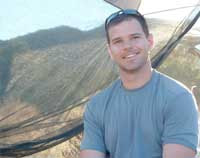 |
| Sam Piha |
Below we continue our interview with youth program leaders who can speak directly to the power of outdoor and wilderness experiences for youth, especially inner-city youth.
Q: Exposing youth to the outdoors can be an expensive and complex task. For programs that do not have access to transportation or camping equipment, what is your recommendation for how they can expose their youth to the outdoors?
 |
| Bob Cabeza, Youth Institute |
Bob Cabeza, Youth Institute: I would strongly recommend partnering with agencies who have lots of experience in outdoor education as well as experience in Youth Development. Make sure that they have diverse staff as role models and leaders for the youth. Otherwise, its usually white enfranchised staff from wealthier socio-economic backgrounds and environments who are totally into the wilderness and environment due to life long access but know very little nor can empathize with inner city minority youth.
A day trip does not give any type of long term impact that a multi-day camping wilderness experience does. They are not the same thing. Also, minority low-income youth need to gain access to beautiful nature, not just a local park. According to National Park data, over 92% of people who visit the parks are caucasian and older. We need to turn that around quickly or this generation will not have the love of the outdoors and advocate for the environment when they get older.
We contract with other agencies and YMCA's nationally to take youth into the wilderness. I would advise programs to start small. Start with a few youth and staff and maybe a three day camping experience. That way, the cost is less and the staff gain confidence and experience as they move forward.
 |
| Brad Lupien, arc |
Some ideas:
- There are lots of curriculum books out there for activities that can be done on a campus. These may be east coast based and out of date but examples include; “Keepers of the Earth” and “And This our Life.” Activities include leaf identification, nature art, gardening etc. Essentially, you can bring nature to the schools. At the same time, getting OUT in nature is preferred.
- There are cheaper ways to get kids into nature. Los Angeles added bus routes that have stops at State Parks. “Surf Bus” offers surf instruction and the bus for free. Online pages offer geocaching in local parks. The DOCENTS at city, state and national parks will do group specific walks/talks for free.
- Finally, we, at arc, use the adventure outings as part of the leadership curriculum. On campus classes and workshops on communication, problem solving, critical thinking, group dynamics are paired with culminating adventure/nature trips. This allows more expensive programs to be paired with less expensive programs which gets the overall budget to align.
Ashanti Branch, Ever Forward Club: I love the outdoor element, but it
 |
| Ashanti Branch, Ever Forward Club |
Q: What kind of experiences does your program offer youth?
Bob Cabeza, Youth Institute: We offer a one week wilderness retreat for our Youth as an entry point to the Youth Institute to help them develop socially and emotionally before we delve into the academic and workforce skill building parts of our program. These experiences are not 'cabin camp'. They are outward bound type of experiences where youth sleep on the ground, build their own shelters, cook, clean, do orienteering, hike, climb, swim in lakes and rivers. They are intense group work learning impactful transformational experiences for youth. Our Youth bond as one family through these experiences and in numerous evaluations, this experience is what keeps them actively engaged in all areas of our program for many years.
 |
| Photo Credit: Youth Institute |
Arc programming ranges from single day adventures (rock climbing, snorkeling, kayaking, mountain biking, hiking, surfing, canyoneering) to multi-day camping and backpacking trips. Staff consist of certified guides to handle the adventures and naturalist/scientist to layer in the hands-on science. Everyone is trained on youth development, leave-no-trace philosophy and group facilitation. Whether working with a college, elementary school, church, or after school program we design the program to meet the unique needs of the group while always blending the “sport” with life and social skills lessons. A day of rock climbing teaches figure 8 knots and ATC use but also how to deal with fear in our lives and how communication is a critical tool in goal setting.
 |
| Photo Credit: arc |
 |
| Dr. Mark Schillinger, DC YMUW |
------------
Bob Cabeza is Vice President of Community Development at the YMCA of Greater Long Beach and Founder of the Youth Institute. The Youth Institute is a year-round program that uses technology as an integral mechanism for promoting positive youth development and developing pathways to post secondary education and career readiness of low-income, culturally diverse urban high school youth. They built their program culture by exposing their youth to wilderness experiences.
Brad Lupien is President and CEO at arc. arc is an after school and experiential education provider. They bridge the opportunity gap by creating transformational learning opportunities that empower youth to realize their full potential. They rely heavily on engaging youth in outdoor sports and wilderness activities.
Ashanti Branch is Founder and Executive Director at Ever Forward Club. Founded in 2004, the Ever Forward Club mentors young men of color in middle and high school by providing them with safe, brave communities that build character and transform lives.
Dr. Mark Schillinger, DC, is Co-Founder of Young Men's Ultimate Weekend (YMUW). The purpose of YMUW is to provide young men with a weekend filled with incredible fun and challenges, while building a foundation for a confident and successful adulthood, through learning the importance of teamwork, developing a sense of accomplishment and acquiring leadership skills.









